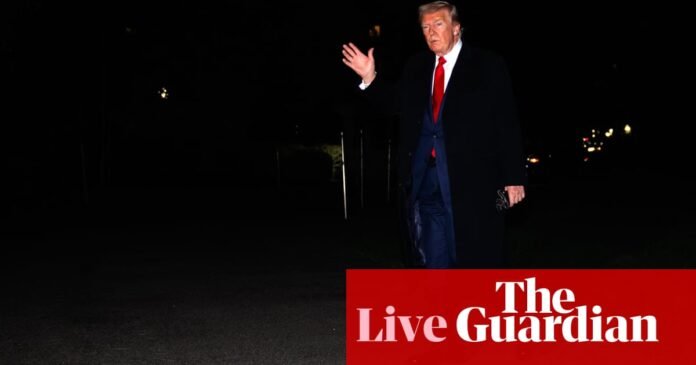Trump signals new tariffs on smartphones and computers
Good morning and welcome to our US politics blog.
In an announcement made late on Friday evening, Donald Trump’s presidential administration exempted smartphones and computers from the 125% levies imposed on imports from China as well as other “reciprocal” tariffs.
The devices would be excluded from the 10% global tariff that Trump recently imposed on most countries, along with the much heftier import tax on China, in what seemed like a softening of the president’s trade positioning towards Beijing.
US stock markets were expected to stage a recovery after the announcement. Shares in Apple and chip maker Nvidia were on course to surge after tariffs on their products imported into the US were lifted for three months.

China’s commerce ministry said the exemption demonstrated the US taking “a small step toward correcting its erroneous unilateral practice of ‘reciprocal tariffs’,” and suggested the American administration cancel the whole punitive tariff regime.
However, Trump’s commerce secretary, Howard Lutnick, said on Sunday that critical technology products from China would face separate new duties along with semiconductors within the next two months.
“He’s saying they’re exempt from the reciprocal tariffs, but they’re included in the semiconductor tariffs, which are coming in probably a month or two,” Lutnick said in an interview on ABC. “These are things that are national security, that we need to be made in America.”
Amid the confusion over the White House’s tariff policy, Trump said he would provide more details on his administration’s approach on semiconductor tariffs later today.
But he suggested any tariff exemption for China-made smartphones would be short-lived, writing on his social media: “Nobody is getting off the hook for unfair trade balances”. Stay with us throughout the day as we bring you the latest tariff developments and other US political stories.
Key events
As we reported in the previous post, the US has sent hundreds of mostly Venezuelan migrants to El Salvador to be held without trial in a controversial mega-prison known for its harsh conditions. The Cecot prison has drawn ire from human rights organisations and has become central to the promise of the Salvadorian president, Nayib Bukele, to rid his country of crime.
What is the Cecot prison?
In February 2023, El Salvador opened what it claims is Latin America’s biggest prison with capacity for 40,000 inmates. The 23-hectare prison is isolated in a rural region 70 km east of capital San Salvador.
Bukele in November said the prison cost $115m to develop and equip. The president declared a state of emergency in March 2022 that remains in effect and has entailed the arrest of more than 84,000 people.
This includes alleged members of El Salvador’s Mara Salvatrucha gan, also known as MS-13, and its rival, Barrio 18.
Government reports put the prison population at 14,500 inmates in August 2024, but a government spokesperson said in March 2025 that the statistic was outdated. A current figure was not disclosed security reasons, the spokesperson said.
Why is the prison controversial?
Cecot has attracted global attention, both positive and negative. Argentine security minister Patricia Bullrich praised the facility in a June 2024 social media post that said: “This is the way. Tough on criminals.”
A US Republican party delegation from the House of Representatives, led by then-Representative Matt Gaetz, visited the prison a month later.
YouTube personalities have had millions of views for their prison visit videos that highlighted harsh conditions in the prison.
Many human rights organisations have criticised El Salvador’s prisons and especially Cecot. Groups have reported alleged human rights violations like torture, inmate deaths and mass trials.
Bukele said in August that “gang members will spend their entire lives in prison.” Justice minister Gustavo Villatoro vowed in 2023 that officials “will make sure none of those who enter the Cecot ever leave on foot.”





